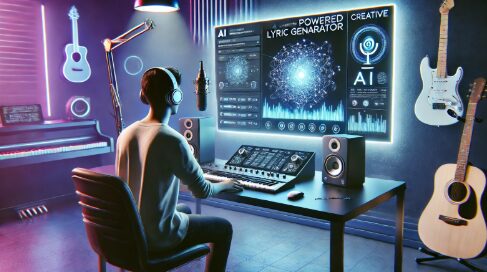Songwriting has always been a deeply personal and creative process. From legendary artists like Bob Dylan to modern pop stars like Taylor Swift, lyrics have carried emotions, stories, and cultural messages. But now, something new is happening in the music world—AI is stepping in to help write songs.
Yes, you read that right. Artificial intelligence is now capable of generating lyrics, and it’s changing the way artists create music. But does this mean machines are taking over songwriting? Not quite. Let’s explore how AI-generated lyrics are influencing modern songwriting trends and what it means for musicians and the music industry.
How AI Is Writing Lyrics
AI-powered songwriting tools use vast amounts of data from existing songs to generate new lyrics. These tools, like OpenAI’s ChatGPT, Google’s MusicLM, or platforms like Amper Music and AIVA, analyze patterns in lyrics—rhyme schemes, word choices, themes—and then create new lines based on that knowledge.
For example, if you give an AI tool a prompt like: “Write a love song about missing someone in the rain,”
It will generate a full set of lyrics based on similar songs in its database.
The AI doesn’t “feel” emotions the way humans do, but it can mimic emotional expression by recognizing patterns in existing songs.
AI as a Co-Writer, Not a Replacement
A lot of artists aren’t using AI to completely replace their songwriting process. Instead, they use it as a creative tool to spark new ideas. Think of it as a songwriting assistant rather than a competitor.
For example, artists might:
- Use AI to generate lyric ideas when they’re stuck.
- Experiment with different moods or styles they wouldn’t normally write in.
- Create multiple variations of a chorus or verse to see which one works best.
This speeds up the creative process and gives musicians fresh perspectives. It’s like having a brainstorming partner who never runs out of ideas.
New Trends in AI-Influenced Songwriting
Now that AI is becoming a part of the songwriting process, here are some major trends emerging in the industry:
- Faster Songwriting and Increased Productivity AI can generate lyrics in seconds, cutting down the time it takes to write a song. This is especially useful for artists who need to produce a lot of music quickly—like commercial songwriters or independent musicians trying to release frequent singles.
Major pop artists already work with large songwriting teams to produce hits. Now, AI is becoming an additional collaborator, helping artists come up with lyrics faster than ever before. - Genre-Blending & Experimentation AI allows artists to easily explore different genres by analyzing lyrics across various music styles. If a hip-hop artist wants to try country music, or a pop singer wants to experiment with rap-style lyrics, AI can suggest lyrics based on those styles.
This is leading to a rise in genre-blending, where artists mix different musical styles in ways that wouldn’t have been as common before. - AI-Powered Lyric Trends in Pop Music Since AI analyzes massive amounts of lyrics, it can detect what themes and words are most popular at any given time. This is leading to a data-driven approach to songwriting, where artists can create songs that match current trends.
For example, if AI notices that songs about self-love and empowerment are trending, more artists might start writing in that style to stay relevant. - AI Can Help Analyze & Understand Lyrics While AI is being used to generate lyrics, it’s also helping music lovers analyze them. Many music platforms and lyric websites provide detailed breakdowns of song lyrics, their meanings, and themes. Websites like LyricsBull offer a vast collection of song lyrics, helping fans explore the words behind their favorite tracks.
This is particularly useful for K-pop and international music fans who want to understand the meaning behind non-English songs. For example, platforms like LyricsBull’s Korean Songs section provide lyrics from popular K-pop tracks, allowing fans to engage with the music on a deeper level.
Concerns About AI in Songwriting
Of course, not everyone is thrilled about AI-generated lyrics. Some musicians worry that it might take away from the authenticity of songwriting. If too many songs are written with AI’s help, will music start sounding the same?
There are also legal and ethical concerns:
- Copyright Issues:** AI-generated lyrics are based on existing songs, which raises questions about originality and plagiarism.
- Loss of Human Emotion:** Can AI truly capture the depth of human emotion that real-life experiences bring to songwriting?
- Job Security for Songwriters:** If AI becomes too good at writing lyrics, will it reduce job opportunities for professional songwriters?
The Future of AI and Songwriting
Despite these concerns, AI is not going away. Instead, it’s becoming a tool that artists can choose to embrace or ignore. Most experts agree that AI won’t fully replace human songwriters, but it will continue to be an important part of the creative process.
In the future, we might see:
- AI-generated lyrics are becoming more common in mainstream music.
- More artists are using AI to co-write songs.
- Ethical guidelines are being developed to regulate AI-generated music.
Final Thoughts
AI-generated lyrics are already making waves in the music industry, influencing how songs are written and produced. While AI can generate lyrics quickly and analyze trends, it can’t replace the raw emotion and life experiences that human songwriters bring to music.
Instead of fearing AI, artists can use it as a tool to enhance creativity and experiment with new ideas, and make the songwriting process more efficient.
At the end of the day, music is about connection. Whether a song is written by a human, an AI, or a mix of both, what really matters is how it makes people feel. And for now, that’s something only human artists truly understand.
What do you think? Would you listen to a song with AI-generated lyrics, or do you prefer music that’s 100% written by humans?





























